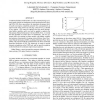Free Online Productivity Tools
i2Speak
i2Symbol
i2OCR
iTex2Img
iWeb2Print
iWeb2Shot
i2Type
iPdf2Split
iPdf2Merge
i2Bopomofo
i2Arabic
i2Style
i2Image
i2PDF
iLatex2Rtf
Sci2ools
110
click to vote
ICASSP
2008
IEEE
2008
IEEE
A GIS-like training algorithm for log-linear models with hidden variables
Conditional Random Fields (CRFs) are often estimated using an entropy based criterion in combination with Generalized Iterative Scaling (GIS). GIS offers, upon others, the immediate advantages that it is locally convergent, completely parameter free, and guarantees an improvement of the criterion in each step. GIS, however, is limited in two aspects. GIS cannot be applied when the model incorporates hidden variables, and it can only be applied to optimize the Maxmimum Mutual Information Criterion (MMI). Here, we extend the GIS algorithm to resolve these two limitations. The new approach allows for training log-linear models with hidden variables and optimizes discriminative training criteria different from Maximum Mutual Information (MMI), including Minimum Phone Error (MPE). The proposed GIS-like method shares the above-mentioned theoretical properties of GIS. The framework is tested for optical character recognition on the USPS task, and for speech recognition on the Sietill task ...
Related Content
| Added | 30 May 2010 |
| Updated | 30 May 2010 |
| Type | Conference |
| Year | 2008 |
| Where | ICASSP |
| Authors | Georg Heigold, Thomas Deselaers, Ralf Schlüter, Hermann Ney |
Comments (0)

